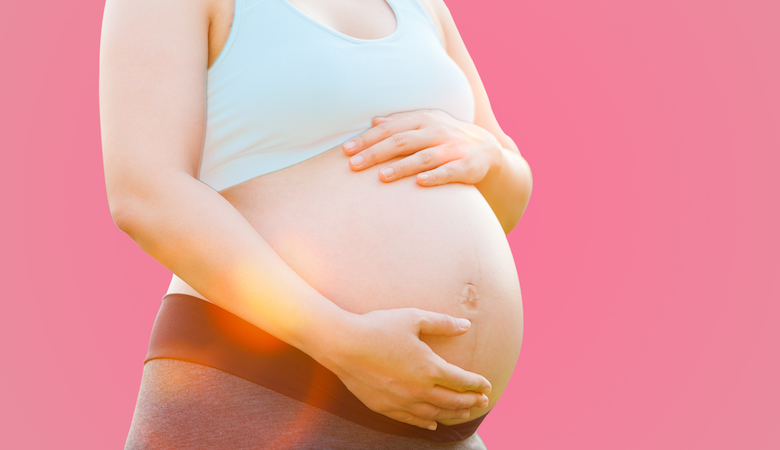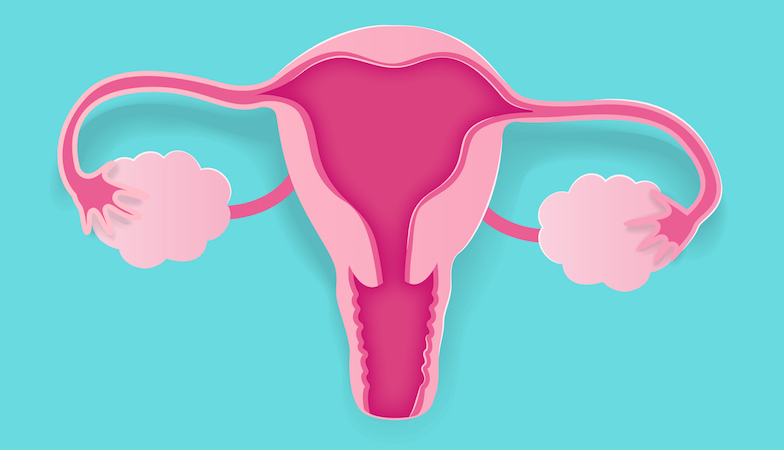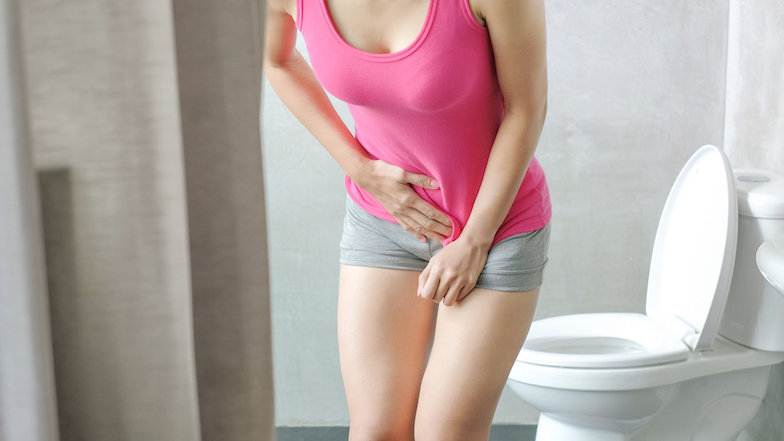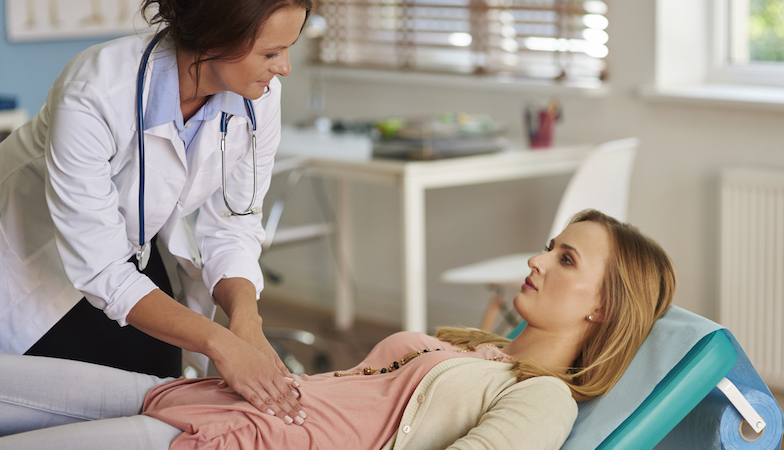Lower abdominal pain in women is common and there could be a number of causes from endometriosis to benign cysts. To kick off our new Ask The Gynaecologist weekly video series, consultant gynaecologist Dr Larisa Corda shares 13 possible causes
Lower abdominal or pelvic pain is common and can be caused by a variety of conditions and diseases, from endometriosis or fibroids to urinary tract infections (UTIs) and irritable bowel syndrome (IBS).
It can broadly be categorised into two groups: acute or sudden onset pain, and chronic or longer standing pain. The pain may be intermittent or constant and can be associated with other symptoms, such as abnormal vaginal bleeding, lower back pain, and vaginal discharge.
Some conditions can cause both chronic and acute pain
While it may seem obvious that pelvic pain in women can arise from reproductive organs, like your uterus or ovaries, bear in mind that it can also stem from a problem within the gastrointestinal, musculoskeletal, or urinary tract systems.
Inflammation, infection, or abnormal tissue growth within any of these organs may cause pelvic pain, amongst other symptoms. Also notice that some conditions can cause both chronic and acute pain.
8 causes of sudden onset lower abdominal pain
Acute causes are shorter than chronic causes; however, they can still last for weeks at a time.
#1 Ectopic pregnancy
If you are in the early stages of a pregnancy and develop sudden onset pain, it is crucial to exclude an ectopic pregnancy, as it could become life threatening. This is where the pregnancy embeds abnormally outside of the uterine cavity.
Abnormal vaginal bleeding, change in bowel habit, and shoulder tip pain can all be associated symptoms but some women may not have any until the structure where the pregnancy is embedded – often the fallopian tube – ruptures, causing severe pain and a sudden drop in blood pressure from blood loss, which can lead to fainting and shock.
#2 Pelvic Inflammatory Disease (both acute and chronic)
Pelvic inflammatory disease (PID) is an infection that affects the organs of a woman’s reproductive system including her uterus, ovaries, fallopian tubes, and vagina. The majority of cases are caused by a sexually transmitted infection, like gonorrhea or chlamydia. Pain may worsen during sex, and there may be other symptoms, like abnormal vaginal bleeding or discharge, as well as a temperature.
#3 Mittelschmerz pain
There is also a type of pain called mittelschmerz pain, which refers to the mild, one-sided pelvic pain felt when an egg is released from an ovary each month. It may also be associated with mild mid-cycle spotting.
On its own, especially if a woman’s always experienced this, it isn’t worrisome and can be perfectly normal. But sometimes the pain experienced is so severe, that women can end up hospitalised and investigated for other acute causes. Typically, the pain settles down after 24-48 hours.
#4 Ovarian cyst rupture
Ovarian cyst rupture is due to an ovarian cyst that a woman may already have. It may cause no symptoms or it may be associated with acute onset pain, often described as a sudden and sharp pain that can begin after sex or strenuous physical activity. If they don’t rupture, ovarian cysts can cause chronic pelvic pain (see below).
#5 Ovarian torsion
Ovarian torsion happens when the ligaments that hold your ovary in place rotate and twist, cutting off the ovary’s blood supply. The cardinal symptom is sudden and severe pelvic pain that may be sharp, dull, or crampy.
Sometimes the pain radiates to the lower back or groin, and some women develop a low-grade fever, nausea, and vomiting. Interestingly, the pain may subside after a while, only to return again later. It’s a critical diagnosis to make as it’s a medical emergency that requires surgery right away to save the ovary.
#6 Appendicitis
This can produce sudden pain that begins near the belly button and moves to the lower right part of the abdomen (which is why it may be mistaken for pelvic pain). Other potential symptoms include a loss of appetite, fever, vomiting, and pain with movement, like walking or rolling in bed. Like an ectopic pregnancy or ovarian torsion, appendicitis is serious and requires immediate medical attention.
#7 Urinary Tract Infection (UTI)
Aside from pain over the bladder region, there are often other associated symptoms with UTIs such as frequency of urination, a burning pain when urinating, having an urge to urinate, and blood in the urine. In older women, the symptoms of a urinary tract infection may be more subtle, such as tiredness and incontinence.
#8 Kidney stones
These may develop when substances in the urine, like calcium, oxalate, cystine, or uric acid, build up and form crystals. A stone can cause excruciating pain if it becomes large and gets stuck in the urinary tract system.
5 Chronic Causes
Chronic pain lasts longer than acute pain; usually six or more months
#1 Endometriosis
Endometriosis is a condition where the tissue that normally grows within your uterus (the endometrium) begins to grow outside it, like on the ovaries, fallopian tubes, and your intestines. Pelvic pain is a common symptom of endometriosis, especially during menstruation and sex.
Women with endometriosis may experience difficulty getting pregnant
The pain can sometimes be felt with a bowel movement or while urinating. Besides pelvic pain, women with endometriosis may experience difficulty getting pregnant.
On March 24th, Healthista will publish a specific Ask The Gynaecologist edition dedicated to endometriosis
#2 Uterine fibroids
Uterine fibroids are benign pelvic growths that can commonly cause heavy or prolonged periods. Fibroids may also cause pelvic discomfort, often described as a dull pressure or pain and if they become very large, can press on surrounding structures like the bladder or bowel, and cause additional symptoms, such as passing urine frequently or a change in bowel habit.
#3 Gynecologic Cancer
Pelvic pain can be a symptom of most types of gyneacologic cancer, though sadly it usually only manifests when the cancer has progressed.
As pelvic pain can be the first sign of a whole range of different far more benign conditions and there is no adequate ovarian cancer screening tool, there is often be a delay in diagnosis, especially with ovarian cancer.
Other symptoms include bloating, lower back pain, abnormal vaginal bleeding (which can also be a sign of cervical cancer) and a change in bowel habit, but again, all these symptoms are non specific and may be associated with many other conditions causing pelvic pain.
#4 Irritable Bowel Syndrome
Irritable bowel syndrome (IBS) typically causes crampy abdominal pain that may be worsened by stress or eating. Besides pain, other symptoms of irritable bowel syndrome include bloating and changes in bowel habit. Sometimes treating stress can help improve symptoms considerably. This condition can also be associated with endometriosis.
#5 Muskuloskeletal
Something as straightforward as a muscle sprain after twisting or lifting can cause pelvic pain
The pelvis is made up of many muscles, ligaments, and tendons. With so many elements comes the potential for several musculoskeletal problems that may cause pelvic pain.
An example of this is a hernia, which is when an organ protrudes through the wall of the cavity containing it. This can also cause sudden onset acute pain and if so, it’s critical to diagnose in case bowel is within the hernia, which could get strangulated.
Also, something as straightforward as a muscle sprain after twisting or lifting can cause pelvic pain.
When to see your doctor
If you experience any sudden onset, severe pelvic pain, especially if you’re pregnant, and if there are any other associated symptoms such as vomiting or a temperature or abnormal vaginal discharge, it’s vital you go into hospital and see a doctor as this could be a medical emergency that requires intervention straight away.
If, on the other hand, your pelvic pain is longer standing, you may have had it for several weeks or months, and in particular if there are associated symptoms, you should go and see your GP as it could be an indication of pelvic disease.
Basically, if unsure or there is something that worries you, please go and speak to your doctor who can take a full detailed history, examination and request tests if necessary, the majority of which are not interventional, and ultimately help to provide you with a diagnosis, even if it is just reassurance.
If in doubt, always consult with a medical specialist, especially if you have a family history of breast or gynaecological cancer, where your risks of disease such as ovarian cancer could be increased. Being aware of what to look out for, and being mindful of what is and isn’t normal, is crucial and will help any woman as she gets older to understand and navigate her gynaecology.
If you experience sudden, severe pelvic pain, especially if it is on one side or if you suspect or know you are pregnant, you need to seek medical treatment immediately.
This is a dangerous symptom of an ectopic pregnancy. Ectopic pregnancies are not common, but they can be life-threatening if untreated. Ovarian torsion and appendicitis, as well, cause sudden pelvic or abdominal pain and require emergency surgery.
Seek emergency care for sudden, severe pelvic pain, especially if it is one-sided or you may be pregnant.
Moreover, women who experience persistent or long-term pelvic pain should be evaluated by a physician. It is important to note that mild cramping and pain associated with menstruation is normal and does not require medical attention unless it is very painful (a condition called dysmenorrhea).
Meet Dr Larisa Corda
Dr Larisa Corda is a Consultant in Reproductive Medicine. She qualified from Imperial College London and her training has been both in the UK and Australia, seeing her gain an understanding and appreciation of gynaecological, obstetric and fertility issues across a wide international population. She believes in a holistic approach to treating a patient that addresses many lifestyle factors, and is a passionate women’s rights ambassador with roles on a number of international charities that have included UN Women and The Circle. She currently works for CREATE using natural and mild IVF techniques to assist conception where needed, is ITV This Morning’s and Channel Mum’s Fertility Expert, regularly appears and is quoted by the media, and has several research interests, some of which have been published. These include the effect of stress on reproductive outcomes, older age motherhood, as well as the current global injustice of inequity of access to reproductive care. She is also brand ambassador for My Lotus, a new ovulation device, and has launched her own website which offers guidance and support for all those wanting a natural empowering approach to their fertility. You can follow her on Instagram and Twitter.
More Healthista Content:
Back pain left this woman on morphine – then a new gadget changed everything
The berry that can make you look younger
The rise of the veggan – why some vegans now eat eggs
Like this article? Sign up to our newsletter to get more articles like this delivered straight to your inbox.

























































